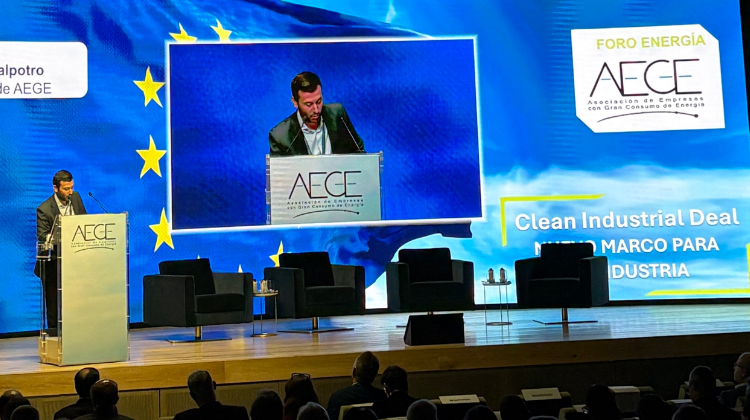The AEGE Energy Forum 2025, held in Madrid under the theme “Clean Industrial Deal: A new framework for industry”, delivered a proposal of major impact for Europe’s energy future: to establish tripartite contracts between the public sector, generators and large industrial consumers.
The idea, presented by José Antonio Jainaga, president of Sidenor, seeks to create stable electricity supply agreements that shield prices, foster renewable investment and reduce industry’s exposure to market volatility.
This scheme, inspired by the French experience, would involve governments in the contractual structure, sharing risks with energy producers and electro‑intensive companies. “These contracts should create a better climate for investment in clean energy, industrial competitiveness and employment,” explained Jainaga, who described the measure as an example of how industrial and energy policy can converge to accelerate decarbonisation.
The proposal comes at a critical time for European industry. The Clean Industrial Deal aims to relieve the loss of competitiveness caused by high electricity costs, taxation and the surcharges associated with balancing services.
Carlos Navalpotro, president of AEGE, stressed the need to “prioritise industrial projects when connecting new capacity to the grid” and recalled that the European Commission already “recognises the possibility of specific frameworks for energy‑intensive industries.”
For the renewable sector, this proposal for tripartite contracts opens an unprecedented path for structural collaboration with heavy industry, with far‑reaching implications for revenue stability and project financing. Santiago Bordiu, CEO of Ignis Energía, summarised it as follows: “Spain has competitive renewables and the ability to attract electro‑intensive demand, but it must commit decisively to industrial projects linked to renewable generation, enable flexible grid access and promote instruments such as decarbonisation auctions and CAEs.”
Consensus was broad: storage, flexibility and a coordinated regulatory framework will be the pillars on which to build this new model of cooperation. In the words of Blanca Losada, president of Fortia Energía, Europe must “evolve towards a model with less and better regulation,” where the price of energy is decoupled from gas and industry acts as an active consumer, contributing firmness to the system.
If the idea of tripartite contracts advances, Spain could become the first European country to test a stable system integrating industrial and energy objectives, speeding the transition towards a decarbonised, renewable‑based electric economy.
Recommendations and challenges of the Clean Industrial Deal
The AEGE Energy Forum 2025 also delved into other critical aspects for the sector. Carlos Navalpotro highlighted the need to implement the recommendations of the Clean Industrial Deal to recover the industry’s competitiveness, hampered by taxation, balancing service surcharges and grid fees.
He also underlined the importance of accessing energy from non‑emitting technologies and decoupled from gas prices, while calling for priority connection of industrial projects to new grid capacity.
The Forum’s first panel, focused on affordable prices for electro‑intensive consumers, featured Silvia Escudero (Statkraft), who emphasised that “storage is an urgent priority to make the power system more flexible and avoid generation curtailments.” Antonio Ramón (Prosolia) added that after reaching renewable maturity, “it is essential to deliver energy at the times when industries need it,” stressing the role of storage as a flexible backup. Prosolia is already integrating batteries into parks such as Albisparks in Portugal to ensure clean and stable energy.
Chema Zabala (Alantra Energy Transition) analysed the impact of the international context on prices, technological evolution and the need to maintain competitiveness despite decarbonisation targets.
Researchers from IIT Comillas presented a study on balancing service costs, which rose from less than €5/MWh in 2020 to more than €25/MWh in May 2025. They proposed a new allocation methodology to reduce distortions and increase predictability, also recommending exemptions or discounts for industrial consumers exposed to international competition.
In the panel on the Clean Industrial Deal, José Antonio Jainaga, Santiago Bordiu and Blanca Losada agreed that Europe is at a decisive moment. Jainaga recalled that energy and tax costs account for half of the industrial bill and welcomed the European framework’s momentum to foster PPAs and renewables. Bordiu stressed that Spain has the opportunity to become Europe’s great clean industrial platform, while Losada warned of the need for the continent to define its own strategy in the face of US and Chinese advances, strengthening its energy autonomy through technology and electrification.
Finally, the last panel, devoted to instruments for industrial competitiveness, brought together Fernando de Juan (Axpo), Abelardo Reinoso (Malaika NET ENERGY) and Diego Rodríguez (Complutense University of Madrid). De Juan highlighted the value of demand‑side flexibility as a savings tool, while Reinoso warned of the risk of losing industrial investment due to a lack of grid infrastructure. Rodríguez, for his part, proposed reviewing energy taxation by eliminating obsolete levies and reducing the Special Electricity Tax to promote electrification.
The Forum concluded with a common message: European industrial competitiveness will depend on a more flexible, predictable electricity system aligned with the real economy’s needs.






























